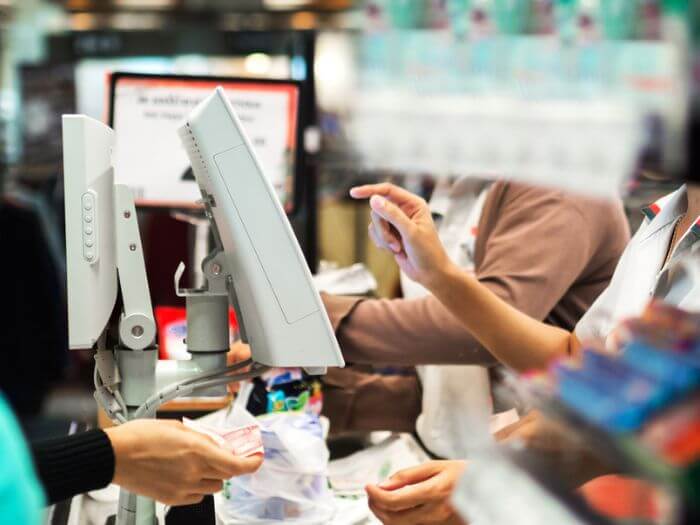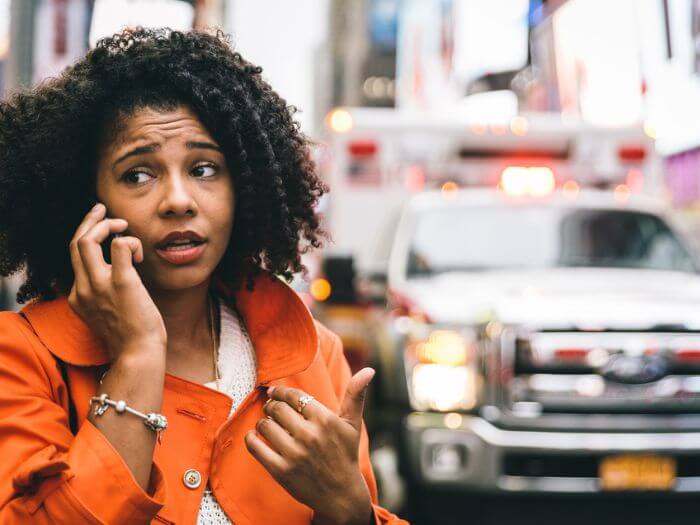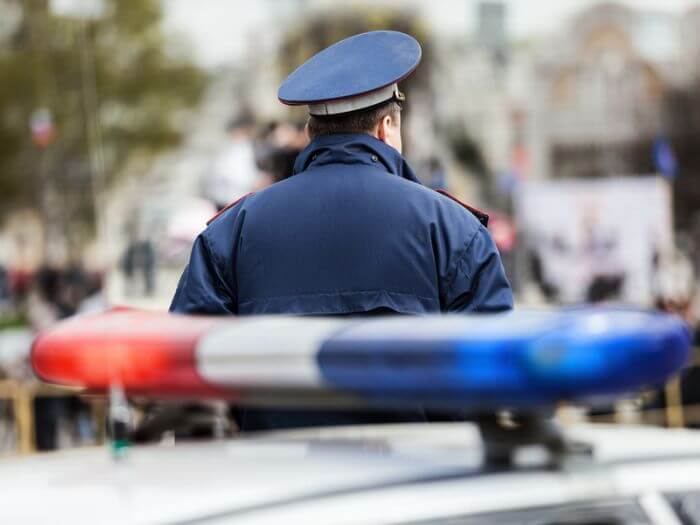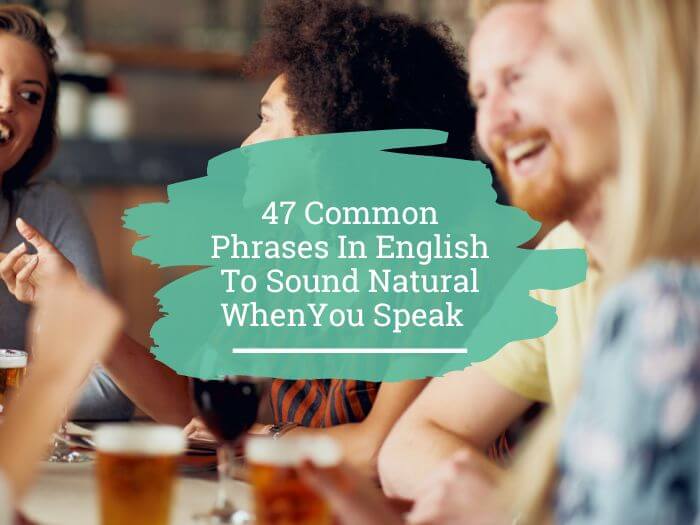If you’re learning English, then a great way to start speaking or even to improve is to learn some common phrases in English.
When you learn phrases rather than words, you avoid making mistakes or appearing rude. That’s because what you would say in your own language may not sound right when translated directly into English.
Even if you’ve been learning English for a while, sometimes you forget the basics. Or maybe the common phrases you learned at school aren’t the ones people use today.
So in this post, you’ll learn 47 common phrases in English for all sorts of day-to-day situations where you might interact with other English speakers.
You’ll learn how to greet people, how to sound polite in English as well as phrases for practical situations like shopping or even emergencies!
Common English Greetings

Greetings are a great place to start when learning common phrases in English. And it's important to use them the right way, according to the formality of a situation and the time of day.
1. Hello
This is the most common way to greet someone in English. It’s no surprise why. You can use “hello” at any time of the day or night. And in any context, from a job interview to with your friends. It’s also what you say when you answer the phone in English.
2. Hi
“Hi” is the more informal version of “hello” that people normally use between friends. Avoid using “hi” with strangers or in a formal setting like at work.
That said, people can sometimes be quite informal in English-speaking countries, so if someone you don’t know says “hi”, like a member of staff in a shop or café, then it’s okay to say “hi” back.
3. Hiya
In some parts of the English speaking world, such as the United Kingdom, people use “hiya” in the same way as “hi”.
4. Hey
This is another informal way to greet someone in English which is used in both the UK and the USA.
5. Good Morning
If you’re looking for a way to greet people in English before lunchtime, then “good morning” is what you can say. This expression is rather formal though.
6. Good Afternoon
This is the greeting you’ll hear from 12pm onwards if you go into a shop or a restaurant or any other setting where you might hear a more formal greeting.
7. Good Evening
You’ll hear “good evening” from around 6pm onwards as a greeting if you go to a restaurant or bar.
8. Goodnight
You use “goodnight” in English when you go to bed. It’s what you would say to your family at home when you decide it’s time for bed.
Common Phrases In English For Introductions

After you greet someone, if you don't know them, then you'll need to introduce yourself. Here are the common phrases in English for introducing yourself and others.
9. I’m… + Name
This is one of the most common ways to tell someone your name in English. Even in a formal setting, like a job interview, it’s usual to use the contraction “I”m” rather than the full form, “I am”.
10. My Name’s
When you meet someone for the first time, you can also say “my name is” or “my name’s” to introduce yourself.
11. What’s Your Name?
You can use this expression to ask your conversation partner their name. Or, after introducing yourself, by saying “my name’s…” you can also say “and you?” to find out their name.
12. Nice To Meet You
Of course, once you’ve introduced yourself by giving your name, the next expression to use is “nice to meet you”. You may also hear people say “good to meet you” or “glad to meet you” or even “pleased to meet you”.
A: I’m Clare, nice to meet you.
B: I’m John, nice to meet you too.
13. How Do You Do?
This expression is confusing, even for native speakers! “How do you do?” means the same thing as “nice to meet you”. There's a difference however between “how do you do?” and “nice to meet you” because “how do you do?” is much more formal.
Here’s how you would use it:
A: I’m Sarah Smith, how do you do?
B: How do you do? I’m Peter Hughes.
14. It’s A Pleasure To Meet You
This expression is also a more formal way to say “nice to meet you”.
15. This Is + Name
If you want to introduce two people who don’t know each other, then you can use the expression “this is + their name”.
Example:
A: Jane, this is Jeff. I don’t think you’ve met
Jane: No, we haven’t. Nice to meet you.
Jeff: Nice to meet you too.
Common English Small Talk Phrases

Once you've greeted people and introduced yourselves, then it's time to continue the conversation by making small talk.
16. How Are You?
After you greet someone by saying “hello” for example, it’s polite to ask “how are you?”
Example:
A: Hi, how are you?
B: Fine thanks, and you?
17. How’s It Going?
If you’re talking to someone you know well, then you can use “how’s it going?” instead of “how are you?”.
A: Hey, how’s it going?
B: Good, thanks. You? *
*As we’re using more informal language, it’s ok to say “you?” here instead of “and you?”. For even more informal ways to ask “how are you”, check out this post on English slang words.
18. I’m Fine
This is how people usually reply to the question “how are you?”. You're not expected to answer this question honestly. In fact, most people will say “I’m fine” even if they’re not feeling good!
A: How are you?
B: I’m fine, thanks.
19. (I’m) Good
“I’m good” is a more informal way to answer “how are you?”. Sometimes people just say “good”.
A: How’s it going?
B: Good thanks! How are you?

20. Not Bad
This is another informal way to answer “how are you” or “how’s it going?”.
A: Hey, how are you?
B: Not bad thanks, you?
21. What Do You Do?
Often, when you first meet someone, they’ll ask the question “what do you do?”. This question means “what’s your job?”. Sometimes people also say, “what do you do for a living?”.
Example:
A: So, what do you do?
B: I’m a nurse. And you?
A: I work in marketing.
22. It’s A Beautiful Day Isn’t It?
People often make small talk in English by talking about the weather. You might also hear people say “it’s a nice day isn’t it?” or “it’s a lovely day, isn’t it?”. Bad weather is also an opportunity to start a conversation as you can say “It’s a terrible day isn’t it?”.
Example:
A: It’s lovely weather isn’t it?
B: It is! It’s supposed to continue until the weekend.
Common Phrases In English For Being Polite

Politeness is important in any language you want to speak. But it’s especially important to speakers of English.
For instance, in your language, it might be ok to ask for things directly, but in English, that’s often considered rude.
23. Please
You can use “please” to automatically make any request in English more polite.
Example:
A: Could you pass me that pen please?
B: Sure, here you go.
24: Thank You / Thanks
Another way to be more polite is to say “thank you”. You can also say “thanks” which is just a more informal version of “thank you”. To be extra polite, you can add “very much” or “so much” after “thanks” or “thank you”.
A: Here’s that book you asked to borrow.
B: Thank you very much!
25. You’re Welcome
This is an expression you use after someone says “thank you”. Other variations of “you’re welcome” include “my pleasure” and “don’t mention it”.
A: Thank you so much for all your help.
B: You’re welcome.
26. I’m Sorry
This expression is a way to apologise in English if you’ve done something wrong. If you want to make your apology a bit stronger you could say “I’m so sorry’”.
A: I can’t believe you borrowed my favourite dress without asking!
B: I’m sorry. It won’t happen again.
27. Excuse Me
If you need to get someone’s attention or stop them in the street to ask a question, then you can say “excuse me”.
This is also the right expression to use if you’re somewhere crowded like a concert or busy railway station and you want to get past people.
Examples:
- Customer: Excuse me, can I have the bill please?
- Waiter: Of course, I’ll bring it right away.
- A: Excuse me, do you know the way to the station?
- B: Yes, sure. You continue straight on and then turn right at the traffic lights.
28. Could You Say That Again Please?
Many people learn to say “could you repeat (please)?” at school but a more common and polite way to ask someone to repeat what they said is “could you say that again please?”.
Example:
Could you say that again please? The connection was bad and I didn't catch what you said.
29. Would You Mind If…?
You use this phrase when you want to make a request more polite. You’ll also hear people say “do you mind if…?”.
Example:
A: Would you mind if I opened the window? It’s rather warm in here.
B: Sure, go ahead
30. (I’m) Sorry To Bother You…
People often add “excuse me” to the beginning of this expression which you would use to ask a stranger for a request or favour.
Example:
A: Excuse me, I’m sorry to bother you, but could you help me carry my shopping to the car? It's rather heavy.
B: Of course. Where's your car?
31. Would You Like…?

When someone comes to your house, it’s polite to offer them something to eat or drink. A polite way to make an offer is to say “would you like…?”
Example:
A: Would you like a coffee?
B: Yes, please.
32. Shall We…?
If you want to make a polite suggestion in English, this is a great way to do it.
Example:
A: Shall we watch a movie?
B: Yeah, why not.
Responding To Polite Requests
If someone asks you to do something in English, here are a few ways you can respond politely.
33. Sure / Sure Thing
If you’re able to help, one way to reply is to say “sure” or “sure thing”.
Example:
A: Could you help me carry these boxes please?
B: Sure!
34. Of Course!
This is an alternative to “sure” that you can use in the same situation.
35. Here You Are

If someone asks you to pass them an object, like the salt on the dinner table or a pen or their phone, you can say “here you are” as you hand them the object. You’ll also hear the expression “here you go” which is a little more informal.
A: Could you pass me a piece of paper please?
B: Here you are.
Common Phrases In English For Shopping
At the shops, you’ll be able to use some of the common phrases in English you’ve already seen like “excuse me” or “I’m sorry to bother you…”. But there are some other phrases specific to shopping that you'll learn now.
36. Can I Try This On?
If you’re in a clothing store and you find an item you like, then you can ask the assistant if you can try it on to see if it's the right size.
Example:
A: Can I try this on?
B: Sure. The changing rooms are over there.
37. Where Are The Changing/Fitting Rooms?
Maybe you’re in a bigger shop and you can’t find the changing rooms. In which case, ask this question to a member of staff.
Example:
A: I’d like to try on this skirt. Where are the changing rooms?
B: Go straight ahead and then turn left at the menswear section.
38. Do You Have This In Size X?

Maybe you’ve found an item you like but you can’t find the right size. In which case, ask this question.
Example:
A: Do you have these shoes in size seven?
B: I’m not sure, let me check.
You can also use this question to ask about colour options e.g. “do you have this in blue?”.
39. Do You Need A Bag?
This is a question you often hear at the checkout after the cashier has scanned your purchases.
Example:
A: Do you need a bag?
B: No thank you.

40. Do You Have A Store Card / Loyalty Card?
At the checkout, the cashier may ask you “do you have a store card?” or “do you have a loyalty card?”. In which case, you can simply reply “yes (I do)” or “no (I don’t)”.
A: Do you have a loyalty card?
B: No, I don’t
41. I’m Looking For…
Whether you’re lost in the shop or you’re looking for something specific and want some help, you’ll need this phrase.
Examples:
A: Excuse me, I’m looking for the menswear department. Could you tell me where it is?
B: Certainly. Take the elevator to the third floor and you’ll find it on the opposite side to childrenswear.
A: Thank you!
Common Phrases In English For Emergencies

In case of emergency, there are a few phrases that can help. Here are the most common ones. Hopefully you won’t need them, but they’re good to know just in case.
42. Somebody Call 911/999
In the USA, 911 is the emergency number, while in the UK it’s 999. If you need help, you can tell people to dial this number.
Example:.
Help! There’s been an accident. Somebody call 911!
43. I Need The Police/An Ambulance/The Fire Brigade
If you phone an emergency number, then they’ll ask you to tell them which emergency service you need. If you're a victim of crime, ask for the police. If there’s a medical emergency, ask for an ambulance. And if there’s a fire, ask for the fire brigade.
Example:
A: Which emergency service do you require?
B: I need an ambulance, quickly.
44. I’d Like To Report A Crime
If you go to the police station because you’re a victim of a crime, this is the expression you can use to say what happened.
Example:
A: I’d like to report a crime.
B: Could you please fill out this form?
45. Somebody Stole My Bag/Phone/Wallet
Did somebody steal a personal item from you? This is the expression you can use when you realise one of these items is missing.
Example:
A: Somebody stole my bag.
B: We should go to the police station to report it.

46. Where’s The Police Station/The Hospital?
This is the question to ask if you want to go directly to the police or the hospital for help.
A: Excuse me, where’s the police station?
B: It’s on the other side of town, near the river.
47. I’ve Been Pickpocketed
This is a common crime in many big cities – somebody steals money or your phone from your pocket or bag while you’re distracted.
A: Oh my God, my phone’s gone – I think I’ve been pickpocketed.
B: Let’s go to the police station to report it.
47 Common Phrases In English
So there you have it – 47 common phrases in English for all kinds of day to day situations that you could encounter in an English-speaking country.
Hopefully, these phrases will help you, whether you’re travelling in an English-speaking country, or living in one, or interacting with native speakers in your job.
Getting the small things right, like using the correct greeting, or knowing how to make small talk, can make a big difference. If you sound polite and friendly because you use the right expressions, then people will find it easier to talk to you.
So, how are you going to learn, remember and use the common phrases in English? While this post is a great start, the best way to learn these English expressions is to apply the StoryLearning method and immerse yourself in English by reading.
As you read short stories in English for example, especially ones with plenty of dialogue, you’ll see these common phrases in English all the time. And thanks to this immersion by reading, you’ll soon learn them and be able to use them.

Olly Richards
Creator of the StoryLearning® Method
Olly Richards is a renowned polyglot and language learning expert with over 15 years of experience teaching millions through his innovative StoryLearning® method. He is the creator of StoryLearning, one of the world's largest language learning blogs with 500,000+ monthly readers.
Olly has authored 30+ language learning books and courses, including the bestselling "Short Stories" series published by Teach Yourself.
When not developing new teaching methods, Richards practices what he preaches—he speaks 8 languages fluently and continues learning new ones through his own methodology.










































